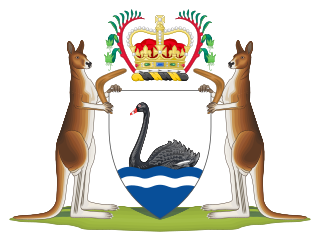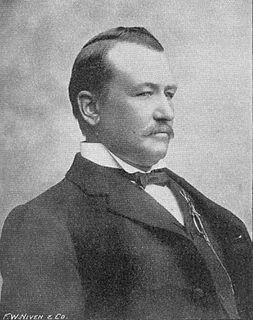Notes
- ↑ De Garis, B. K.; Colebatch, Hal Sir, A political biography of Sir Hal Colebatch , retrieved 2 March 2012
- ↑ De Garis, B. K. (1985), British influence on the federation of the Australian colonies, 1880-1901 , retrieved 2 March 2012
Brian De Garis is a Western Australian historian. He edited a number of important texts about Western Australia history. His Masters thesis was about Sir Hal Colebatch [1] His doctoral thesis entitled British influence on the federation of the Australian colonies, 1880-1901 was completed at Oxford University. [2] He taught and was involved in administration at University of Western Australia, and Murdoch University

The premier of Western Australia is the head of government of the state of Western Australia. The role of premier at a state level is similar to the role of the prime minister of Australia at a federal level. The premier leads the executive branch of the Government of Western Australia and is accountable to the Parliament of Western Australia. The premier is appointed by the governor of Western Australia. By convention, the governor appoints as premier whoever has the support of the majority of the Western Australian Legislative Assembly. In practice, this means that the premier is the leader of the political party or group of parties with a majority of seats in the Legislative Assembly. Since Western Australia achieved self-governance in 1890, there have been 31 premiers. Mark McGowan is the current premier, having been appointed to the position on 17 March 2017.

Sir Harry Pateshall Colebatch CMG was a long-serving and occasionally controversial figure in Western Australian politics. He was a member of the Western Australian Legislative Council for nearly 20 years, the twelfth Premier of Western Australia for a month in 1919, agent-general in London for five years, and a federal senator for four years.

Alfred Edward Morgans was the fourth Premier of Western Australia, serving for just over a month, from 21 November to 23 December 1901.

The Imperial Federation refers to a series of proposals in the late 19th and early 20th centuries to create a federal union to replace the existing British Empire, presenting it as an alternative to colonial imperialism. No such proposal was ever adopted, but various schemes were popular in Australia, Canada, New Zealand, and other colonial territories. The project was championed by Unionists such as Joseph Chamberlain as an alternative to William Gladstone's proposals for home rule in Ireland.

The Federation of Australia was the process by which the six separate British self-governing colonies of Queensland, New South Wales, Victoria, Tasmania, South Australia, and Western Australia agreed to unite and form the Commonwealth of Australia, establishing a system of federalism in Australia. The colonies of Fiji and New Zealand were originally part of this process, but they decided not to join the federation. Following federation, the six colonies that united to form the Commonwealth of Australia as states kept the systems of government that they had developed as separate colonies, but they also agreed to have a federal government that was responsible for matters concerning the whole nation. When the Constitution of Australia came into force, on 1 January 1901, the colonies collectively became states of the Commonwealth of Australia.
Hal Gibson Pateshall Colebatch was a West Australian author, poet, lecturer, journalist, editor, and lawyer.

Sir Henry Bruce Lefroy was the eleventh Premier of Western Australia.
The Colonial Secretary of Western Australia was one of the most important and powerful public offices in Western Australia, in the time when Western Australia was a British colony. The Colonial Secretary was the representative of the British Colonial Office in Western Australia, and was usually appointed from Britain. He was responsible for all official correspondence between the colony and the Colonial Office. He was at all times a member of the Western Australian Legislative Council and the Western Australian Executive Council.
The Forrest Ministry was the first government ministry in Western Australia, after the inauguration of responsible government. It was in government from 29 December 1890 to 14 February 1901, when it was succeeded by the Throssell Ministry following the 1901 elections.

An agent-general is the representative in cities abroad of the government of a Canadian province or an Australian state and, historically, also of a British colony in Jamaica, Nigeria, Canada, Malta, South Africa, Australia or New Zealand and subsequently, of a Nigerian region. Australia's and Canada's federal governments are represented by high commissions, as are all Commonwealth national governments today.

The Electoral district of Perth is a Legislative Assembly electorate in the state of Western Australia. Perth is named for the capital city of Western Australia whose central business district falls within its borders. It is one of the oldest electorates in Western Australia, with its first member having been elected in the inaugural 1890 elections of the Legislative Assembly.
The following lists events that happened during 1953 in Australia.
The Chief Justice of Western Australia is the most senior judge of the Supreme Court of Western Australia and the highest ranking judicial officer in the Australian state of Western Australia. The chief justice is both the judicial head of the Supreme Court as well as the administrative head. The chief justice is responsible for arranging the business of the court and establishing its rules and procedures.

Secessionism has been a recurring feature of Western Australia's political landscape since shortly after Federation in 1901. The idea of self-governance or secession has often been discussed through local newspaper articles and editorials. On a number of occasions secession has been a serious political issue for the State, including in a successful but unimplemented 1933 state referendum.

Until Australia became a Federation in 1901, each of the six colonies were responsible for their own defence. From 1788 until 1870 this was done with British regular forces. In all, 24 British infantry regiments served in the Australian colonies. Each of the Australian colonies gained responsible government between 1855 and 1890, and while the Colonial Office in London retained control of some affairs, and the colonies were still firmly within the British Empire, the Governors of the Australian colonies were required to raise their own colonial militia. To do this, the colonial Governors had the authority from the British crown to raise military and naval forces. Initially these were militias in support of British regulars, but British military support for the colonies ended in 1870, and the colonies assumed their own defence. The separate colonies maintained control over their respective militia forces and navies until 1 March 1901, when the colonial forces were all amalgamated into the Commonwealth Forces following the creation of the Commonwealth of Australia. Colonial forces, including home raised units, saw action in many of the conflicts of the British Empire during the 19th century. Members from British regiments stationed in Australia saw action in India, Afghanistan, the New Zealand Wars, the Sudan conflict, and the Boer War in South Africa.

James Gardiner was an Australian politician who served in the Legislative Assembly of Western Australia from 1901 to 1904 and from 1914 to 1921. He served as colonial treasurer under two premiers, Walter James and Henry Lefroy. Gardiner was also the inaugural state leader of the Country Party from 1914 to 1915, and briefly served as Speaker of the Legislative Assembly from March to June 1917.

In 1929, Western Australia (WA) celebrated the centenary of the founding of Perth and the establishment of the Swan River Colony, the first permanent European settlement in WA. A variety of events were run in Perth, regional areas throughout the state, and even across Australia such as the Western Australian Centenary Air Race.
The Lefroy Ministry was the 13th Ministry of the Government of Western Australia and was led by Nationalist Premier Sir Henry Lefroy. It succeeded the Second Wilson Ministry on 28 June 1917 due to most members of the former Liberal Party, of which the previous Premier, Frank Wilson, had been the leader, pledging allegiance to the new party. The Lefroy Ministry, which was the first Coalition ministry in Western Australia, was also the only Ministry of a non-Labor government to be chosen by caucus.
The following events occurred in February 1953:
William James George CMG was an Australian engineer and politician who served in the Legislative Assembly of Western Australia from 1895 to 1902 and from 1909 to 1930. He was a minister in the governments of Frank Wilson, Henry Lefroy, Hal Colebatch, and James Mitchell.